Today it emerged that world leaders are to discuss what is being described as “land grabbing” or “neo-colonialism” at the G8 meeting next week. A spokesman for Japan’s ministry of foreign affairs confirmed that it would raise the issue: “We feel there should be a code of conduct for investment in farmland that will be a win-win situation for both producing and consuming countries,” he said.
Olivier De Schutter, special envoy for food at the UN Office of the High Commissioner for Human Rights, said: “[The trend] is accelerating quickly. All countries observe each other and when one sees others buying land it does the same.”
Some of the largest deals include South Korea’s acquisition of 700,000ha in Sudan, and Saudi Arabia’s purchase of 500,000ha in Tanzania. The Democratic Republic of the Congo expects to shortly conclude an 8m-hectare deal with a group of South African businesses to grow maize and soya beans as well as poultry and dairy farming.
Other countries that have acquired land in the last year include the Gulf states, Sweden, China and Libya. Those targeted include not only fertile countries such as Brazil, Russia and Ukraine, but also poor countries like Cameroon, Ethiopia, Madagascar, and Zambia.
De Schutter said that after the food crisis of 2008, many countries found food imports hit their balance of payments, “so now they want to insure themselves”.
Continue Reading Fears For The World’s Poor Countries as The Rich Grab Land to Grow Food




 3rd Quarter 2023 Wrap Up: The “AI Revolution”: The Final Coup d’Etat? (88 pages)
3rd Quarter 2023 Wrap Up: The “AI Revolution”: The Final Coup d’Etat? (88 pages)  Turtle Forth Cap
Turtle Forth Cap 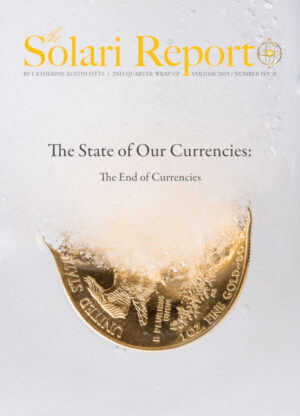 2nd Quarter 2019 Wrap Up: The State of Our Currencies (154 pages)
2nd Quarter 2019 Wrap Up: The State of Our Currencies (154 pages) 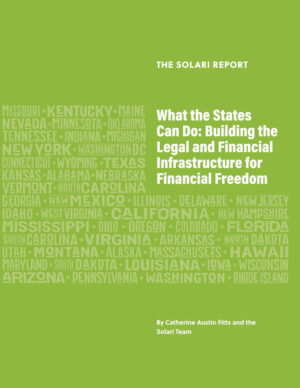 What the States Can Do: Building the Legal and Financial Infrastructure for Financial Freedom (64 pages)
What the States Can Do: Building the Legal and Financial Infrastructure for Financial Freedom (64 pages) 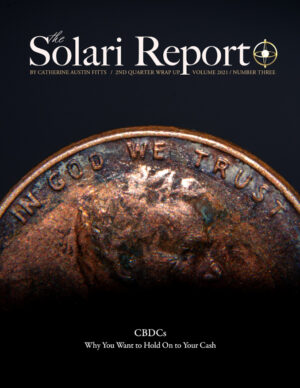 2nd Quarter 2021 Wrap Up: CBDCs - Why You Want to Hold On to Your Cash (144 pages)
2nd Quarter 2021 Wrap Up: CBDCs - Why You Want to Hold On to Your Cash (144 pages)  1st Quarter 2019 Wrap Up: Will ESG Turn the Red Button Green? (98 pages)
1st Quarter 2019 Wrap Up: Will ESG Turn the Red Button Green? (98 pages) 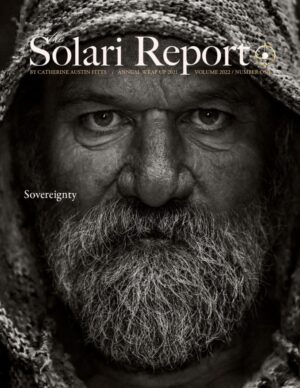 2021 Annual Wrap Up: Sovereignty (232 pages)
2021 Annual Wrap Up: Sovereignty (232 pages) 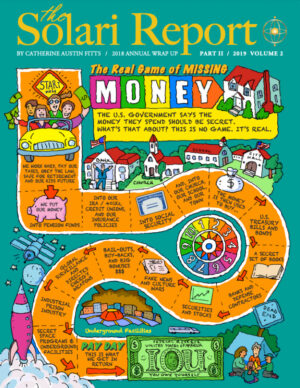 2018 Annual Wrap Up: The Real Game of Missing Money, Volume 2 (194 pages)
2018 Annual Wrap Up: The Real Game of Missing Money, Volume 2 (194 pages) 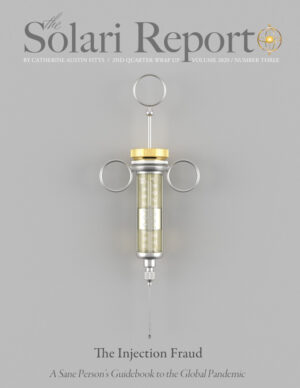 2nd Quarter 2020 Wrap Up: The Injection Fraud (132 pages)
2nd Quarter 2020 Wrap Up: The Injection Fraud (132 pages)
Catherine:
Thank you for that synopsis.
Bert:
I agree that scarcity can be used as a fear technique to get ones to follow an agenda. However – we cannot continue on the path we are on in relation to consumption and the way that we treat our very source(the earth) as a wastebasket and a whore with no inherent value. I think along with questioning the motives of a co-opted sustainability movement it is important to come to terms with the facts that are raised within the arguments. Sorry – but our root views about the earth and our place in it are skewed. And no that doesn’t automatically translate into let’s wipe people off the earth – it means more along the lines of what for example the American Indians said about the way they observed the colonizers carrying themselves – i.e. – disrespectful, arrogant, and violent because of their own insecurity in the world. I personally believe that we are in the midst of a cycle of change that occurs every so many thousands of years(whether it is a sunspot cycle or some other cycle that may or may not be being kept from us) – I am saying ALSO that the way that we have abused the earth has led us to a point where these changes could reduce our chances of survival dramatically.
If we want to understand how finance(the illusory economy) has hijacked and is now dictating to the “real economy” of tangible goods and services, we must first understand the root of this. And that is the way that we view the earth and concurrently other peoples – you know, the “thems” whose resources, labor, etc. required to maintain the empire as the basis of it(source material). That meaning – the economic theories that divorced any inherent value from nature except in as much as what it could translate into for us through human labor. This perspective leads to all kinds of skewed versions of reality and leads to outcomes. This is the basis for both capitalism AND communism – they are brothers of the same philosophical system. We cannot be surprised that the tool(money, finance) that was used to facilitate transactions of real goods and services has now usurped the throne and is now in a position of a dictating oligarchy. It was only a matter of time. Our base theories are flawed. And the reason why a “sustainablity” movement won’t work in the form that is is now is because the same people who created the problems are now the ones who want to make the solution. Their flawed views of reality = let’s not address the root causes of our dilemma, but let’s create solutions that will not call into question the very power relationships that got us into this mess. Or more realistically – the “solutions” are filtered through an entrenched centralized bureaucracy that waters down any meaningful changes that could be made – because making the real changes would mean reducing their very powers to make changes and be dictatorial.
Everything that you listed as “points throughout history” are actually points in which the empire changed and adapted, became more centralized yet was still operating from the core value systems that formed its basis. Anything that takes the land and kills the original owners is flawed to begin with. The justification for this initially was a form of elitism – elitism of a chosen people taking what was rightfully theirs from pagans and heathens(meaning lower sub-humans). I don’t know how one can see the elitism of the New World Order and not see that the fundamental ideological groundwork has been there since the start – even before the foundations, or the Federal Reserve, or GATT or NAFTA or . . . fill in the blanks.
Guy,
Glad you’re still here.. thought I may have lost you. Hope others are checking-in.
So, here are some rough thoughts on various additional courses of action. This is for discussion only at this point, as the goal is leverage these topics in order to engage in a more tangible adult-level conversation.
– Climate Change legislation may raise electricity rates by 90%. Hence, I would argue that the public might want to protest this by ceasing payment of electricity bills. Do you realize how important the electricity grid is? It is the single point of failure for their Technetronic devices (TV, Radio, Internet, etc.) that are critical to perpetrate their Information Operations (ie. mechanisms of control). Cease using electricity and it is only a matter of weeks before the public begins to engage in independent thinking and reverts back to a state much more difficult to control.
– Secure the huge public surplus currently under government control (85,000 Consolidated Annual Financial Reports produced every year showing public asset surplus).
– Confront agents of the technocracy in person (we know who they are). But not like COINTEL actors (with a bullhorn and kids dressed in black), but in a polite, deliberate, professional, no nonsense manner. Have you ever spoken to any of these people in person? I haven’t found one who is anything other than a wimp in person, and who will do anything to avoid a serious adult-level conversation with a responsible intelligent member of the public. They need to understand that the public understands what it is that they are doing to us… the crimes that they are perpetrating.
– Migrate to local support structures across trusted networks (ie. the Solari model). I’m including more than simply food, however, I’m also talking healthcare, legal support, education and the like. Further, we localize ONLY under the pretext that this action is req’d for survival while we cease their plans, as it is critical that GAIA-bots are not allowed to gain ownership of this localization agenda with their humanity vs nature dialectic. This dialectic cannot succeed, as it inherently results in the end of humanity.
– Stop listening and following ALL COINTEL groups and vector leaders. This includes just about everyone in the public domain right now. (See “Total Information Dominance” doctrine from US Military 2020 document).
– Cease acceptance of all manufactured dialectics…. like manufactured scarcity (“scar-city”) of environment, food, energy, finance, etc…. as these techniques amount to the bee keeper poking a stick in the hive to get the bees to fight each other. The ideas of scarcity as a dialectical enemy was manufactured by the Club of Rome.
– Recognize and resist 4th Generational Warfare (4GW) techniques that are already being perpetrated on the public while simultaneously and falsely blaming the public for these acts. This includes manufactured terrorist acts designed to incite domestic fear and violence.
Bert:
I’m still following. This is a good and important convo.
Catherine,
It seems that the blue collar industry workers and retirees are no longer needed, and that is now, not at some point in the future.
Everytime I do a high level SWOT analysis on the publics situation I develop new reasons to support that we are further along than I previously realized. I think this continues to be the prime reason why I am advocating a stance where we simply don’t run to safety zones, as I ultimately find that all the zones are either non-existent or booby trapped. This is why I’ve continue to conclude that this system must be stopped sooner rather than later, and that the damage can only begin to be reversed AFTER the system is contained.
Shortly, I’ll post some thoughts here on other steps we may consider to complement the suggestion put forward by Solari.
Is anyone still following this discussion, because we’re getting to beef now.
Bert:
My assessment is that, no, the folks at the very top do not still need us. The decision to proceed with GATT reflected that fact.
However, properly managing our transformation to “a world where we are not needed” is much more profitable than not, the absence of proper management is very dangerous (generally, the folks at the top are very afraid of people when they turn. When “the field” turns and locks against rulers or aristocracy, things can be very dangerous) and there are a whole lot of people whose power and money come from managing and they are vested in running the thing out for their careers.
So, we may not be needed, but getting from a world in which we were, to a world in which the fact that we are expendable is fully actualized is quite a long process.
If you have not see the cartoon movie, Monsters, Inc, I strongly recommend it for contemplating some of the issues involved.
Catherine
Catherine,
I’m reminded of Sun Microsystems Bill Joy and his question, “Do they still need us?”
Do they still need the economic fuel that the American people provide in order to execute their plans. For the economic fuel has always been merely a means to an end, an end which involves power and control. With GATT executed successfully and most of the American enterprise now out of the publics reach, how can the public be impactful using purely economic weapons?
Local is not just about building wonderful communities. It is about real economic warfare – cutting the Tapeworm’s meal off at the root.
Cash Flow #1: Narcotics…lots of money being sucked out of your county that finances the Tapeworm
Cash Flow #2: Government money engineered with the help of officials elected with rigged computer voting
Cash Flow #3: Government reserves and pensions funds — bank deposits and investments to channel to Wall Street
Cash Flow #4: Private bank deposits and investments — more deposits and investments to channel to Wall Street
Cash Flow #5: Takeover of market share of small business/retail market using our monies form Cash Flow #1-#4
Cash Flow #6 Mortgage and other financial fraud
Cash Flow #7 Derivatives on Cash Flows #1-7
Cash Flow #8 Ad revenues resulting from pricing set by our media attention
Cash Flow #9 Donations — to church, school, not for profits….and resulting bank deposits and endowments
And on and on….
If we can not switch the cash flows AWAY from the people we do not want running things and into the people we do want running things….well ALL SOLUTIONS START WITH THIS SHIFT….
WHO CONTROLS THE MONEY IN YOUR WALLET X 300 MM PEOPLE
WHO CONTROLS THE MONEY IN EACH FAMILY X ? FAMILIES
WHO CONTROLS THE MONEY IN EACH COUNTY X 3100 COUNTIES?
THIS IS A CRITICAL BUILDING BLOCK OF THE POWER WE NEED TO IMPLEMENT REAL CHANGE.
Bert.
How do we resist? Give something concrete. Do you agree with this statement? – ‘The logic of local and self-sufficient economies and food systems makes sense on levels which COULD benefit communities.’ Now identify the areas where it can be taken over – and give a concrete example of how to resist against this. Do any of the Solari ideas make any sense – on a resistance level?
Benj.
Good point. These are the things that we have to be vigilant against. Many people are not willing to keep it on that level – but that is what it takes to stay free.
Yup, and here’s the trap already being setup, being introduced by Reps. Henry Waxman (D–CA) and John Dingell (D–MI). Wonder why the NYT doesn’t mention this pending legislation when it is also extolling the virtues of local farming?
“New Bill (HR2749) Gives FDA Unheard-of Power over Small Farmers, Food and Supplement Producers”
http://aahf.nonprofitsoapbox.com/index.php?option=com_content&task=view&id=825&Itemid=
We’re being put into a box!
We’re allowing ourselves to be pushed into a very tight box with almost no discussion around the future that we are allowing to be created for us. Do we really want this image of our future reality for our grandchildren?…
http://www.radoxist.com/download/my_works/stills/worth_enough_2500.jpg
At some point we must resist, and the longer we wait the weaker and more controlled we become. And the more we let the GAIA-bots promote this “humanity is the enemy” meme created by the Club of Rome, the harder it will be to resist a humanity-crushing path. I think God would tell us not to allow these horrid untruths into humanity’s consciousness, and to fight against it and all of its manifestations with all of humanity’s heart and soul.
Maybe keep it disorganized. If you organize anything your doing their work for them, they’ll take it over. They don’t tax you for working on your own house or working in your garden yet..do it yourself. But honestly there comes a point in a game of chess where you just can’t win unless the other player makes a really bad mistake. Find a place at the edge of the board and wait for a big mistake? They’d lose all their advantage of pitting one side against another if they had a one world order. Especially if they had one person as the world leader. Bible prophesy says that will be Satan himself and Christ will put him in the pit.
Bert:
I agree with your take on localization as it is being proposed by many groups.
That said, we have to move on both fronts. Power comes from bottom up and top down. And economic power is in your backyard, in your infrastructure and your global satellite systems, etc.
So we have to move on all fronts. Question is how. Essential that we each do what we can incrementally.
Meantime, you bet I am developing my own food supply. Given the national debt and the current state of the legal system, I am completely clear the extent to which it is not “mine.”
I am also do what I can to not invest, purchase from or support those 5 businesses or to affirm their leadership.
What would you tell the average citizen that they can do?
Catherine
Guy,
In short, we must not go along with their plans, that is our only option. It is therefore imperative to recognize their plans, and to openly discuss them in order to avoid very appealing and propagandized enticements.
This move toward localization is indeed part of their plan, a plan that seeks to establish a dialectic that sets an extremely sophisticated and technologically equipped superclass against the feudal masses.
With respect to the point at which “the individual” allowed to survive independently of vast control systems, I think that is certainly a debatable question. Americans certainly had varying degrees of liberty and independence, and much more freedom was at hand prior to all the institutions that you mentioned. But we can certainly look back at points throughout history and ponder that question…. of when was the tipping point. Here are only a few data points for the purpose of thought and discussion, in rough chronological order:
– The usurpation of the Articles of Confederation with the US Constitution.
– Samuel P. Chase Supreme Court decision to make Forced Tender legal.
– The Civil War’s usurpation of State Power under Federal Power.
– The origination of elite Foundations
– The passage of the Federal Reserve act along with the foundation of the IRS.
– The introduction of the League of Nations
– Academic think tanks introduction of plans to mass produce enlightenment as systems of control.
– Carnegie Foundation’s plan to modify the US Education system and amalgamate it with the Soviet system
– The building of the United Nations and the USA’s membership to this organization
– The successful selling of the manufactured Cold War dialectic and the resulting increased budgets and development of military industrial complex techniques.
– The Club of Rome’s development of new external threats (i.e. “Global Warming” & “Global Scarcity”) in order to replace the soon to abandoned Communism vs Capitalsm dialectic that was soon to be abandoned.
– GATT and the commensurate deployment of an international computer network (“The Internet”)
I guess we could continue with this list for quite an extensive period, and I’m not sure what we would ultimately gain from that exercise other than to learn that the public either goes along with elite plans, or is simply unaware of them, or simply does not understand their intended consequences.
Our key to survival is to reverse this trend, to recognize the techniques as they are deployed, to discuss the intended goals and to refuse to comply. Our complicity is our greatest weakness. For example, we now have 5 agribusiness multinational corporations who virtually control our food supply. Please tell me why the public should simply accede this food production to these controllers, and relegate ourselves to food production in rooftop gardens and the like? We should not let this happen, we should stop them from shutting down from taking all of the agricultural resources and then creating false scarcities. This is a moral issue, and we should be combating it head-on instead of running from it.
” Localization is like taking a few squares on the edge of the board but if you control enough of those you could make a move on the center….Taxing people and taking what they have limits the opponents ability to make alternatives, all thier resources are spent defending against the center.”
* That is a good point and definitely something to keep in mind. So – what moves can we make to make us more self-determined in the path of localization?
In a game of chess it’s important to control the center. This allows you to limit the movement of the other player. As long as your making the threats and the other player is reacting to them your in control. Monopolizing the mainstream would be like controlling the center, both colored squares Left (black squares) and right (white squares) but only in the center. The players would be the insiders vs. the outsiders. Localization is like taking a few squares on the edge of the board but if you control enough of those you could make a move on the center….Taxing people and taking what they have limits the opponents ability to make alternatives, all thier resources are spent defending against the center.
Bert:
I have to ask you – how does the work of Solari fit into all this, because it seems to me that you are saying that all this move towards localization(which Solari indeed is part of) is part of manufactured groups used to fulfill a long held agenda.
Also –
At what point was “the individual” allowed to survive independently of vast control systems or not isolated from fighting back against larger institutions? You have the debt you pay for your car, your house(which are both owned by the bank who gave you the money in the first place), your need to go to the industrialized food chain to get your food, your need(through threat of imprisonment) to pay taxes, government eminent domain, forced conscription into the military should the government decree it so, etc. The individual already hasn’t for years and years lived independently from vast control systems. We already have feudalism – most people don’t own anything they have anyway, whether their homes or cars. You are in debt bondage your whole life and have to work in wage slavery for a good portion of it just to survive.
Could you please share your vision as to an effective course of action.
Guy,
Right, small groups are marginalized and the big groups set the agenda. The groups that “guide this agenda” were deliberately manufactured. This is what the work of Herbert Markuse demonstrates. It’s not some “feeling” by white Christians, as you are implying. It’s similar to the pincer techniques used in the former soviet union, where the left is leveraged to apply pressure from the bottom while the right applies it from the top. It’s all designed to co-opt. That is my overarching point.
This push to local farming is part of an overall effort to co-opt… its is inherent in the plan… it is NOT something that might happen later, or be “co-opted” at some future date. Surpra national organizations have been established to govern what we can grow, how much and where. As said in The Blueprint to Advance Sustainable Development article, “Sustainable Development is a pseudonym for centralized control over human life.” Local independent farming is just one part of an overall effort to isolate the individual against large global institutions, whereby they are powerless to fight back. It is quite naive to think that individuals will be allowed to survive independently of vast control systems. Aldous Huxley tells us this. Two distinctly different classes of being are being created, one with all the advantages of modern science and unlimited resources and the other constrained to some form of feudalism. Once in this dialectic, I see no option for the lower class other than total submission, as 4GW (4th Gen. Warfare) will neutralize any meaningful thoughts of rejection.
Your all caps use of the term ‘reality’ in your sentence, “The REALITY of the matter is this…,” was not missed, and neither is the arrogance or naivety behind it. The fact of the matter is, that many of the assumptions that you present have been given to you without sufficient independent analysis. I strongly suggest a re-evaluation of the assumptions themselves and the sources from where they emanate. If your parents handed them down, can you source where they received them from? If not, how do you know that your basis assumptions are not already co-opted? Bottom line, you don’t.
Yeah Guy, it’s like unity in diversity means support everything openly but cut the legs off it at the same time. I simplify things by remembering the two lies in the garden of Eden. Ye shall not surely die and you shall be as gods. All these movements and organizations to give people a feeling of “empowerment” but they get less and less power over thier own lives. They players play on the imagination. To turn everybody into like obstinate children each thinking they know everything. Right and wrong a matter of opinion that nobody can question. Satanists say the law of Satan is “do what thou will”. That would be fine if everybody was good but not so good when it also applies to thieves and murderers. Unity in diversity. Do what thou will (diversity) fear not that any God will deny you (Unity).
re: Street Farmer.
“In 2005, he received a $100,000 Ford Foundation leadership grant. In 2008, the MacArthur Foundation honored Allen with a $500,000 “genius” award. And in May, the Kellogg Foundation gave Allen $400,000 to create jobs in urban agriculture.”
They didn’t CREATE him, but this is how you would co-opt something like local farming. It’s through the teat of funding.
Read the “The U.N. Plan for Your “Sustainable” Community,” thanks for sharing it. Seems to me that this perspective is fed by the feeling of lack of control by people who feel marginalized. People who have a certain value system – i.e. middle class Christian & I’m assuming white – that they feel is being forcefully taken away by an agenda run by liberals(feminists, welfare advocates, environmentalists).
What is interesting here is that the groups mentioned that form the “special interest groups that guide this Agenda” – i.e. “Sierra Club, Earthlinks, Women’s International League for Peace and Freedom, Greener Alternatives, Pacific Bell, Peace Child, United Nations Association-USA, Environmental Ecological Services, Change Management System, Countywide Joint Task Force on Sexual Harassment, Prevention and Education, and the Human Care Alliance (about 80 service providers and community groups), and the Welfare and Low-Income Support Network”, besides the Sierra Club, Pacific Bell and the UN association of USA are mostly community organizations run by social workers. If you visit any of their websites, you can see what kind of budget they have to work with, and most of them look like they are just getting by. Most of these community organizations also depend on funding from the federal, state, local governments and private donations for their budgets.
The REALITY of the matter is this – the good intentions that these people have who run these community organizations is SUBSUMED by what they can and cannot do because they suckle at the teat of government and private donations. Once they get into an alliance with a larger group – I.E. the Federal government or corporate sponsors – their agenda becomes subsumed under the stipulations that these organizations carry for funding. All of a sudden for example, the “poor and low income” working groups who are on the ground in the communities and may have a good idea of what SHOULD be done because they are involved with the people are constrained by what the federal government says is appropriate or what the corporate sponsor says, etc. In reality, the corporation, the federal government, etc. thrive in a system which does not ALLOW for real solutions to poverty because doing so would be questioning their whole basis for existence and power/control within the society at large.
Look at the UN – in its founding documents it has some good language. BUT – it was setup after WWII as an instrument for a new world system with the US and its corporate interests and its allies having overwhelming dominance and control over its agenda. This system had a role in facilitating the centralization of wealth and control within certain sectors who now, because of their bargaining position have the ground floor opportunities to dictate and guide crisis management scenarios. It means the same folks who caused the mess are in charge of cleaning it up. The system is trying to adapt to new scenarios, some self created and some dictated by the climate meanwhile maintain the same people at the helm. THAT is the problem. With all the talk about justice, peace and equality it is the same institutions who are controlling the discourse and ALLOWING others to speak. For example the Pope talking about justice and equality in the face of its 2000 year reign of genocide, murder and oppression. Or the US saying its a new day because they have a black president yet the finance/military/industrial complex has an even greater stranglehold over the society and culture. Power is NOT given up freely and any crisis is going to be used and framed under the rubric of protecting certain interests.
Local farming is GOOD, consuming less is good(that’s what our elders taught us – remember? don’t live beyond your means?), being conscious about purchasing decisions is good, building community is good. This is where we need to go. Now, the issue is co-optation. How is goldman sachs or this new world body with private interests trying to maintain control going to try to co-opt it. Is it by controlling the market on carbon credits? Is it through a world currency or local currencies subsumed under a currency controlled by private bankers? THAT is what we have to figure out and INSULATE and CREATE communities that CANNOT be controlled this way – I think that is what the Solari model is about(correct me if I’m wrong). This is about sovereignty and REAL justice and respect for our communities and our planet, something which these power players CANNOT and WILL not grant no matter how much their language changes.
Guy,
I completely agree that they are not all powerful. But to diffuse the power that they do perpetrate it is crucial to properly understand their techniques and goals. To get an understanding of these goals, I suggest beginning with an introduction to Agenda 21. A possible starting point is the following …
Agenda 21, The U.N. Plan for Your “Sustainable” Community
http://www.crossroad.to/text/articles/la21_198.html
“…current lifestyles and consumption patterns of the affluent middle class – involving high meat intake use of fossil fuels, appliances, home and work-place air-conditioning, and suburban housing – are not sustainable. A shift is necessary. which will require a vast strengthening of the multilateral system, including the United Nations…” Maurice Strong , opening speech at the 1992 UN Conference on Environment and Development
Freedom Advocates
http://www.freedomadvocates.org/
Michael Shaw has done some wonderful work.
Agenda 21 — The Blueprint to Advance Sustainable Development
http://www.freedomadvocates.org/articles/sustainable_development/agenda_21_–_the_blueprint_to_advance_sustainable_development_20040615100/
In this straightforward expose of Agenda 21 — the blueprint to advance Sustainable Development — Beckett examines the notion of “sustainability”. His conclusion: The American people need to be better informed so they understand that Sustainable Development is a pseudonym for centralized control over human life.
Bert:
Global capitalism/empire is running into the reality that it cannot expand infinitely on the same trajectory. On some fronts, reality is catching up to the players. Unfortunately many are not ready to get rid of their paternalistic meglomania and are not willing to give up the ego which tells them that they must be at the helm(elitism). This is why I don’t think the correct use of energy is poo-pooing the issues that have been brought up as to the limits of our planet’s ecosystem versus the way that the dominant economic paradigm operates(infinite growth/unbridled expansion). The issue as I see it is that because of the unprecedented power centralized in certain sectors, brought about by said economic paradigm – there is a major danger of these issues being co-opted and setup in ways where these power players are in on the ground floor(like Goldman Sachs on the ground floor of cap and trade). Since they have the networks, power and resources at their disposal and the “rest of us” do not have such power in our community’s hands, it is obvious that we are ill prepared for a self-determined and sovereign position within all of this. The fact that we are seeing more articles about local farming, etc. is not necessarily a top down propaganda campaign to push an agenda – it is more so the powers that be trying to perhaps “co-opt” something that could be good as the “next big thing.” They can and WILL find a way to co-opt it and bring it under their watchful eye – and that is why this time is crucial. If we understood the way these things work, we could work to insulate these community efforts from being co-opted. “THEY” are not all powerful and I have found that the more we buy into that, the more powerless we become and the more power – real and imagined we give to “them.”
It is up to all of us now to be trying to organize with our fellow community citizens so that we are more self-reliant and self-determined. We can NEVER expect the “powers that be” to hand us freedom.
They bee pushing neo-feudalism on the public, that’s why you’re seeing so much propaganda on local farming. Gotta bee reducing our global footprint… and when THEY say “footprint” they are not speaking in figurative terms. They mean to reduce the number of our feet walking on this planet because they simply don’t need so many of us anymore and because they want to increase their leverage of control over us.
Sorry to burst bubbles, but time to see reality as it is.
Guy, nice find. Thanks for posting that. Uplifting reading among all the gloomy economic reading I do 🙂
didn’t know where to post this, Catherine – maybe you would consider posting it in your blog?
http://www.nytimes.com/2009/07/05/magazine/05allen-t.html?_r=1&em
Al Gore sets a dangerous precident with GAIA. To them god flows through everything and everything is god. They may choose not to desecrate a sacred tomatoe and eat Al Gore instead.
@Ed et al.
Yes, I can see a day where it will be more profitable to grow large Fir trees on farm land with the Carbon credit scheme in place. Especially with supranational bodies stipulating carbon ceilings for each nation and territory, there will be no choice but to grow big CO2 sucking trees to comply with mandates.
I agree here that one major goal is profits, but the United Nations Agenda 21 and other relevant plans clearly and most importantly state the goals are regional population control.
What’s so unfortunate in all of this is that there is such a large population of GAIA idolizing left wing folks who have bought into the Club of Rome’s new dialectic of Humanity vs. the Planet that I don’t see how we change this trajectory. The Al Gore followers simply cannot be reached any more with this type of discussion.
http://www.medicalecology.org/pdf/presentation/VF-How_to_proceed.pdf
Carbon + farmland + ted turner produced this insane piece of work….It goes well with the Rockefeller seed bank. Technology to live on Mars or technology to live on earth once it becomes like Mars or in Cities once all the land is wilderness. Or just a hoax explanation of how people will survive without farmland.
http://www.argentina-estancias.com/inflationhedge-farmland.htm There’s a lot to be found online by searching different combinations Carbon + farmland. Who knows which angles will win and be most profitable, no-till farming, planting trees instead of crops, anything they say that will sequester carbon has potential. Then there’s the Chicago climate exchange that Obama is heavily involved with, the infant dow jones of personal carbon trading, that’s sure to get favorable attention…
Catherine,
Something like this http://www.planetizen.com/node/24378, I think the personal carbon trade will have to evolve some, the value of carbon credits increase before turning farmland into wilderness becomes extremely profitable. Of course it’s all based on a fiction “global warming” but that’s nothing a pen and legislation can’t fix.
Carbon Credits and un-utilized farm land – http://www.iowafarmbureau.com/special/carbon/default.aspx
Removing farmland from farming, on a coordinated basis, could make a spike in food prices rather quickly- an easy way to manipulate a market. No fancy Goldman software or political corruption needed! Much less alternative uses like planting large “carbon sink” species. Or biofuel species.
(It does help to control the media, though. Then panic about “the coffee shortage” or whatever is easier to initiate and control.)
I do not see “carbon credits” as the next bubble; it is already too late for engineering that, although I am sure it is being tried. The command and control apparatus necessary is becoming dysfunctional due to mistrust between the major players (banks and corporations).
The next bubble is really money itself. Or debt.
There is just NO WAY that the quadrillion+ dollars of CDO swaps (a good estimate) can be rationalized in a system denominated in trillions.
We have all seen what uncontrolled leverage, motivated by greed (fear) can do. The human-scale
scenarios we have been discussing in the context of agriculture should have just the right amount of leverage- traceable, responsible, and transparent.
Yes, I can put up a website without knowing or even seeing HTML using my mac; leverage of communication does not amplify my voice- only its reach. But a distinction can be made between local knowledge, which embodies experience as an agent of transmission, and data or information-
which are lower rungs on the ladder of wisdom…something I think we all must learn to climb…
Edward:
Could you describe more? How can removing farm land from farming make money under carbon credits?
Catherine
It’s optimistic to think that farmland today will be farmland tomorrow. If an investor found it more profitable to not farm land to offset industry with carbon credits…etc. etc.
Wow, sovereignty and trust! Think of the markets we could enjoy! I dream of equity e-bays and prosper.com’s that the SEC can not shut down…
Ralph: good points. empire is in contradistinction to the local wisdom that has taken thousands of years to develop in different areas of the world. cultures, livelihoods are swept away continuously in the name of “progress” and paternalistic arrogance. now imagine if there was mutual respect of sovereignty what kind of trading relationships COULD exist – it COULD be amazing and beneficial to all involved.
All:
The link to the aformentioned quote re: DRC Congo is here:
http://200milesup.newsvine.com/_news/2006/12/08/474497-worlds-biggest-mining-rush-
In juxtoposition, look at this fact about DRC Congo in relation to hydroelectric power from tapping the immensely powerful water streams that feed the River Nile:
“The country has limited energy resources, but potential to generate enough power to run just about the entire African continent.”
Now mind you, although our skewed maps do not show it, Africa is THE largest continent on the planet. Never mind the amount of sun energy that can be tapped.
Look at this as well:
“A just-published report by RBC Capital Markets (RBCCM), penned by analyst Mark Smith, states that the DRC “is one of the most well endowed countries in the world with respect to mineral potential. After our recent RBC-sponsored field trip, we have taken a detailed look at the country’s mineral potential, and set that against the infrastructure challenges it faces if it is to unlock its vast resource wealth”.
Smith’s report reviews 11 companies with key operations in the DRC, which houses an estimated 80% of the world’s coltan (a colloquial name for columbite-tantalite, a metallic ore comprising niobium and tantalum), 34% of its cobalt and 10% of its copper reserves. The country’s gold potential is virtually untouched, with the Congo craton being Africa’s largest under-explored region in terms of Archaean geology.”
These are resources that colonialism and neo-colonialism have denied Africans from using in the interest of their self-determination. This is also a primary reason for the genocide in the area(one which far outnumbers the German holocaust of Jews and others in the WWII era) – competing factions funded by “rich countries” fighting for resource control
This does not bode well for health or local empowerment…
One of the benefits of eating locally-produced food is that the plants and the people are attuned to each other; although this concept requires a wider definition of “life” and “intelligence” it does resolve the disparate dietary results found on the Weston A. Price website.
Indigenous populations, well aware of plant spirits in their diet, will be the losers when their local foods are replaced with high-protein, high-margin, storable, shippable, and “scientific” frankenfoods that have the soul bred out of them in their transition from co-creation to consumable to commodity.
Maybe Big Pharma can make vitamin supplements specific to each bio-region, complete with local “qi”, to sell to the foreign consumers to “beef up” their health quotas…
Then these pills could be covered under the various national health plans! Except, of course, in the U.S…
UN Agenda 21 plans, created years ago, now being implemented in order to control/contain food production by limiting available land for its growth. Nothing really new here, even though this is how the media presents it to the public.
One thing is for certain, their will be no discussion on how to curtail this practice at the upcoming G8 meeting. If anything, there will be charts presented that show progress as compared to planned goals to determine if they need to speed up their activity.
These guys are working according to a business plan and its associated schedules. There is no misunderstanding about what is occurring amongst anyone who will be attending this international meeting.